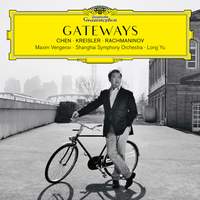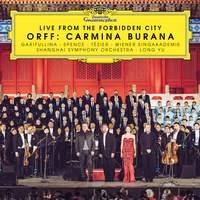Interview,
Long Yu on Gateways
 The Shanghai Symphony Orchestra is one of the fastest-rising stars in the classical world, though as an ensemble it is no youngster - established three years earlier than the Berliner Philharmoniker. Evolving through various guises through the years, today it is a fully-fledged symphony orchestra and has become one of China's cultural flagships.
The Shanghai Symphony Orchestra is one of the fastest-rising stars in the classical world, though as an ensemble it is no youngster - established three years earlier than the Berliner Philharmoniker. Evolving through various guises through the years, today it is a fully-fledged symphony orchestra and has become one of China's cultural flagships.
As part of Deutsche Grammophon's 120-year celebrations, the label has welcomed the SSO to its illustrious family of artists, and their debut recording with DG proudly showcases their country's musical heritage with two works by Shanghainese composer Qigang Chen (as well as Kreisler's Tambourin chinois, a nod to older notions of China as seen from the outside). Counterbalancing these are Rachmaninov's mighty Symphonic Dances - a juxtaposition that might seem curious but, as Long Yu explained, is far from random. He was kind enough to speak to me not just about his repertoire choices but about the broader classical landscape in China.
Originally created in the late nineteenth century as more of a band than an orchestra, and one geared almost exclusively towards Western expatriate audiences rather than Chinese ones, the SSO today is clearly a very different animal. Can you tell us a little about its evolution over 140 years of at times tumultuous social development?
From the last 140 years you can see how cultural life has developed in the Far East: for me, it’s amazing to see how that happened across the past three decades with this orchestra, and to play a role in introducing different kinds of music to the society and community. You can see from the Shanghai Symphony Orchestra’s history that they have premiered many pieces, ever since their earliest days - for example, in the early 1900s they gave the Asian premieres of Beethoven’s Symphony No. 9 and Stravinsky's The Firebird - and there have been so many major artists like Jascha Heifetz and Fritz Kreisler who worked with the SSO or performed in the city. The orchestra was the only institution to introduce that music to the community; 2019 marks 70 years since the Chinese Revolution and shows how the orchestra is continuing to play its role in serving the city and country as a whole.
Of course we are commissioning a lot from major composers from the West and the East (including Penderecki and Qigang Chen), and we’re also doing a lot of incredible work trying to discover a lot of pieces never performed in China, from composers all over the world; recently we did Kurt Weill’s Seven Deadly Sins in Shanghai’s summer festival MISA (Music in the Summer Air), and in the coming two seasons we are planning to introduce some composers whose works have never been performed in Shanghai. For this orchestra, it has always been interesting and inspiring to bring more musical works to the stage and to let people understand there are so many things we can really share, and I think that's especially true today: people often talk about Eastern and Western culture, but for me the only thing we can do is to introduce as much as possible to the people.
Last year, as part of Deutsche Grammophon’s 120th anniversary celebrations, you were instrumental in signing the SSO up to this prestigious record label. How did this partnership come about?
Certainly China and Shanghai have become very interesting to all different institutions. I think that DG discovered the Shanghai Symphony Orchestra as a very historical orchestra, but one that is full of youthful energy. It’s become the leading orchestra in Asia and China, and it’s obvious that in DG’s 120 year history they have always been looking for the future energy of the classical world. We’re very happy to start a relationship with them, and it is a very symbolic year for us to start working together.
You have been described as “leading the development of the orchestral landscape in China”. Would you say this development is still ongoing, or is the Chinese orchestral world now essentially on a par with the long-established ensembles of Europe and Russia?
I’m very pleased and proud to see classical music being well developed in China. Over the past twenty years the previous generation went abroad and performed on the international stage, then came back and developed this completely new classical music scene back at home. Comparing what we have now with the music scene in China twenty years ago, it’s really exciting to see how far we’ve come: today we have 64 symphonic orchestras across the whole of China. Of course these are all types and sizes of orchestra, but it shows that classical music has been very much welcomed in China and I think that will continue to develop. Besides our country’s economic development, it’s very important to see how the culture is developing in China today, and how this is being supported by an audience of musical lovers - it shows people that once this economic development has taken place, the cultural life will also develop. Maybe China will become one of the most important platforms for classical music in the future, which is exactly what we hoped for twenty years ago. This is very special for my generation, as after two decades of hard work, we’ve really made a big difference in Chinese cultural history. I’m very happy that to see that we’re now even being recognised internationally, and that makes our work much more meaningful. We’re now looking forward to the future generation to continue this work, which will hopefully continue to develop even further over the next twenty years.
The Western orchestra always seems something of an outsider in the Chinese concert-hall, and of course a parallel tradition using orchestras of Chinese traditional instruments also exists. What do you think the future holds for these two strands of large-ensemble music-making in China, with interest in its own, native cultural treasures on the rise?
This is a question which I'm asked a lot. Of course it’s always interesting to discover new music, but as we are a symphony orchestra we do perform a lot of standard repertoire. And although today the musicians in the Shanghai Symphony Orchestra are no different from other symphony orchestras, we also work a lot with Chinese contemporary composers: we’re performing Qigang Chen’s Wu Xing (Five Elements), for instance, on our current tour. Qigang Chen uses a lot of Chinese elements in his music, but if we are talking about a completely Chinese traditional orchestras of Chinese instruments, that’s a different affair altogether… As I am Chinese, I certainly know most of our traditional instruments and how they sound and function, and I’d be very happy if in the future I could have a chance to present them on an international stage, but that sort of thing takes time. It’s very challenging work, as people are maybe curious but not very knowledgeable – something similar has happened with Indian music and instruments to a certain extent, though, so the potential is there.
Chen Qigang’s piece Wu Xing (Five Elements) portrays the five classical Chinese elements – Water, Wood, Fire, Earth and Metal. The Ancient Greeks used a different selection of four elements, which have often been the inspiration for art in the West. Have the Wu Xing occupied a similar place in Chinese art (musical or otherwise) over the centuries?
The five elements means a lot for not just Chinese but also Asian people. We believe everything is cyclical: the water makes wood in life, wood makes fire in life, fire makes earth in life, earth makes the metal in life, metal makes the water in life, and so on. And the opposite is also true: fire kills wood, wood kills earth, earth kills water, water kills fire, fire kills metal, metal kills wood. In a sense it's like human life: if you’re doing things in the right direction and have a positive energy then everything is alive, and if you give out negative energy then everything is killed.
The main meat of this album is Rachmaninov’s Symphonic Dances; is there a particular connection between these and the other pieces you’ve recorded here?
It makes a lot of sense that the Shanghai orchestra taps into that Russian feeling: because Shanghai is the most important musical city in China, it has always had strong connections with Russian and Jewish musicians. In the last century a lot of Russian refugees came down to Shanghai to work and teach in the aftermath of the Revolution, and later on there was an influx of Jewish musicians because of the Second World War. Russian composers in particular did a lot of wonderful work in Shanghai: even the first music competition here was founded by a Russian composer.
Not surprisingly, the new generation of Chinese musicians are starting to attract attention in international competitions – Eric Lu not least, of course, who’s appearing with you at the BBC Proms in September. Are there any rising stars within China that you think are names to watch for the future?
I often work with young musicians, and I am looking forward to performing with Eric Lu for the first time at the BBC Proms later this month. Two other young pianists whom I work with in China are Johnson Li and Serena Wang, who are both ones to watch!
Long Yu and the Shanghai Symphony Orchestra perform music by Qigang Chen, Mozart and Rachmaninov at the BBC Proms next Sunday.
Gateways: Chen - Kreisler - Rachmaninov
Maxim Vengerov (violin), Shanghai Symphony Orchestra, Long Yu
Gateways was released on Deutsche Grammophon in June.
Available Formats: MP3, FLAC, Hi-Res FLAC
Aida Garifullina (soprano), Toby Spence (tenor), Ludovic Tézier (baritone)
Shanghai Symphony Orchestra, Long Yu
Available Formats: MP3, FLAC, Hi-Res FLAC




